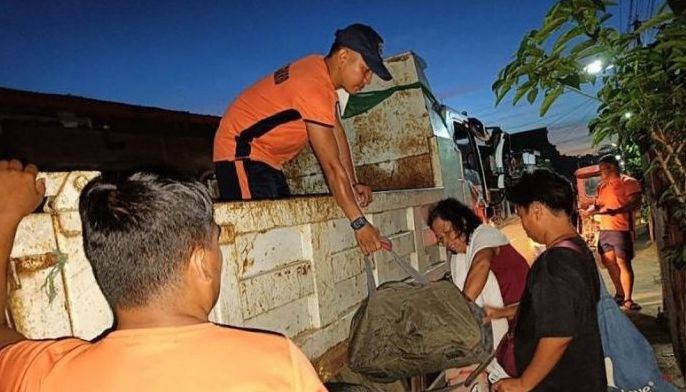MANILA, Philippines (Updated 11:31 a.m.) — Philippine authorities ordered all vessels back to shore and people in coastal communities to leave their homes Saturday as Super Typhoon Pepito (international name: Man-Yi) neared the storm-weary archipelago nation, with forecasters expecting it to intensify before making landfall.
Pepito will be the sixth major storm to pound the Philippines in the past month, killing at least 163 people, leaving thousands homeless and wiping out crops and livestock.
Related Stories
With wind gusts of up to 215 kilometres per hour (133 miles per hour), Pepito was on track to slam into the sparsely populated island province of Catanduanes later Saturday or early Sunday.
About 255,000 people have already been evacuated from their homes in regions that are vulnerable to landslides, flooding and storm surges, Interior Undersecretary Marlo Iringan said Saturday, urging others to heed warnings to flee.
"If preemptive evacuation is required, let us do so and not wait for the hour of peril before evacuating or seeking help, because if we did that we will be putting in danger not only our lives but also those of our rescuers," he said.
In Albay province, Legazpi City grocer Myrna Perea was sheltering with her fruit vendor husband and their three children in a school classroom with nine other families after they were ordered to leave their shanty.
Conditions were hot and cramped -- the family spent Friday night sleeping together on a mat under the classroom's single ceiling fan -- but Perea said it was better to be safe.
"I think our house will be wrecked when we get back because it's made of light materials -- just two gusts are required to knock it down," Perea, 44, told AFP.
"That's why we evacuated. Even if the house is destroyed, the important thing is we do not lose a family member."
Scientists have warned climate change is increasing the intensity of storms, leading to heavier rains, flash floods and stronger gusts.
About 20 big storms and typhoons hit the Southeast Asian nation or its surrounding waters each year, killing scores of people, but it is rare for multiple such weather events to take place in a small window.
Forced evacuations
Evacuation centres were filling up on Catanduanes island in the typhoon-prone Bicol region, with the state weather forecaster warning Saturday of "widespread incidents of severe flooding and landslides".
More than 400 people were squeezed into the provincial government building in the capital Virac, with new arrivals being sent to a gymnasium, provincial disaster officer Roberto Monterola told AFP.
"The Rawis gym has a history of typhoon damage so people are afraid to go there," Monterola said.
"The upper walls are made of glass which could shatter if hit by a strong gust of wind and they could get injured."
Monterola said he had dispatched soldiers to force about 100 households in two coastal villages near Virac to move inland due to fears storm surges could swamp their homes.
"Regardless of the exact landfall point, heavy rainfall, severe winds, and storm surges may occur in areas outside the predicted landfall zone," the forecaster said.
Back 'to square one'
Pepito will continue to intensify as it nears the Philippines and could "reach super typhoon category" in the coming hours, the forecaster said.
In Northern Samar province, disaster officer Rei Josiah Echano lamented that damage caused by typhoons was the root cause of poverty in the region.
"Whenever there's a typhoon like this, it brings us back to the mediaeval era, we go (back) to square one," Echano told AFP, as the province prepared for the onslaught of Pepito.
All vessels -- from fishing boats to oil tankers -- have been ordered to stay in port or return to shore.
The volcanology agency also warned heavy rain dumped by Pepito could trigger flows of volcanic sediment, or lahars, from three volcanos, including Taal, south of Manila.
Pepito will hit the Philippines late in the typhoon season: most cyclones develop between July and October.
Earlier this month, four storms were clustered simultaneously in the Pacific basin, which the Japan Meteorological Agency told AFP on Saturday was the first time such an occurrence had been observed in November since its records began in 1951.


